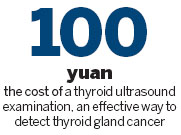
Top cancer specialists have revealed a double-digit annual rise in the number of thyroid cancer cases in China over the past decade, especially among young and middle-aged women.
Last year, the incidence rate was 6.56 cases per 100,000 people, making it among the top 10 most common forms of cancer on the mainland, according to the latest national cancer report released by the National Central Cancer Registry under the Ministry of Health.
 |
The thyroid is a gland in the neck which produces hormones to regulate vital body functions like the heart rate and blood pressure.
"Thyroid cancer is among the fastest growing cancers in recent years in China, and these figures might still be an underestimation," said Liu Yuewu, a leading cancer specialist at Peking Union Medical College Hospital.
A veteran thyroid cancer oncologist, he said each year his hospital performs more than 1,100 thyroid surgeries on average, against around just 10 back in 1986.
The disease took off particularly in the 1990s on the mainland, and today at least 80 percent of those affected are young and middle-aged females.
"I have treated a 5-year-old girl with the cancer," Liu added.
Chen Wanqing, deputy director of the National Central Cancer Registry, added: "The reasons for the increases aren't exactly clear, but factors like increasing exposure to radiation, mounting workload and mental pressure, and irregular lifestyles could be significant."
A World Health Organization report in 2011 showed that exposure to radioactive iodine could increase the risk of thyroid cancer, as the substance tends to concentrate in the gland after being inhaled.
That risk from radiation exposure is higher in children and young adults, it said.
Previously, some had linked rising thyroid cancer cases in China to compulsory iodized salt consumption, which started in 1995 on the mainland to help prevent iodine deficiency disorders.
However, Liu said other countries like Australia and Brazil had also practised the public health strategy on salt without seeing a rise in numbers, although he noted that cases have increased significantly in many countries, including the United States, where its incidence has tripled in the past 15 years.
Improved screening methods, particularly after the 1990s, have helped detect far more patients than before, Liu explained.
A thyroid ultrasound test, which costs a bit more than 100 yuan ($16), is highly efficient at spotting a lump as small as 0.2 centimeters.
A 35-year-old middle-school teacher surnamed Xu from Beijing, who is due to receive a thyroidectomy, told China Daily: "My doctor suggested I schedule a thyroid ultrasound as she felt a lump in my neck during an annual body examination.
"It turned out to be cancer, but at least it was treatable because it was discovered at this early stage," she recalled.
"Now I am most concerned that I will have a big scar on the neck."
According to Liu, many patients discover their cancer during routine physical checkups, with the majority caught at an early or middle stage, giving them a more than 95 percent chance of living at least another decade.
"It has a much higher survival success rate than other cancers," he said.
But he pointed out some hospitals are still not competent enough at handling the surgery needed.
"Each month we receive patients whose previous surgeries failed," he said.
Contact the writer at shanjuan@chinadaily.com.cn







